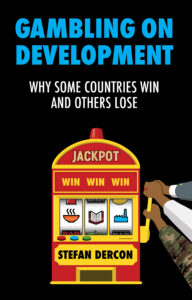Gambling on Development: Why Some Countries Win and Others Lose w/ Stefan Dercon
Oxford, OX1 3BQ
Economist and government adviser Professor Stefan Dercon looks at why some countries have prospered in recent decades and why others have failed.
Dercon has spent decades visiting developing countries and talking to prime ministers, civil servants and ordinary people in his quest to find out what brings success. He argues that a set of policies does not lie behind the difference but rather a ‘development bargain’ in which a country’s elites switch from protecting their own position to espousing a growth-based future. He says this is behind the success of countries such as China, Bangladesh, Ghana and Ethiopia.
Dercon is professor of economic policy and director of the Centre for the Study of African Economies at the University of Oxford. He is a former Department for International Development chief economist and a policy advisor to the UK foreign secretary. Here he talks to Professor Ian Goldin, professor of globalisation and development at the University of Oxford and a former vice-president of the World Bank.
About Gambling on Development
In the last thirty years, the developing world has undergone tremendous changes. Overall, poverty has fallen, people live longer and healthier lives, and economies have been transformed. And yet many countries have simply missed the boat. Why have some countries prospered, while others have failed?
Stefan Dercon argues that the answer lies not in a specific set of policies, but rather in a key ‘development bargain’, whereby a country’s elites shift from protecting their own positions to gambling on a growth-based future. Despite the imperfections of such bargains, China is among the most striking recent success stories, along with Indonesia and more unlikely places, such as Bangladesh, Ghana and Ethiopia. Gambling on Development is about these winning efforts, in contrast to countries stuck in elite bargains leading nowhere.
Building on three decades’ experience across forty-odd countries, Dercon winds his narrative through Ebola in Sierra Leone, scandals in Malawi, beer factories in the DRC, mobile phone licences in Mozambique, and relief programmes behind enemy lines in South Sudan. Weaving together conversations with prime ministers, civil servants and ordinary people, this is a probing look at how development has been achieved across the world, and how to assist such successes.
RSVP
